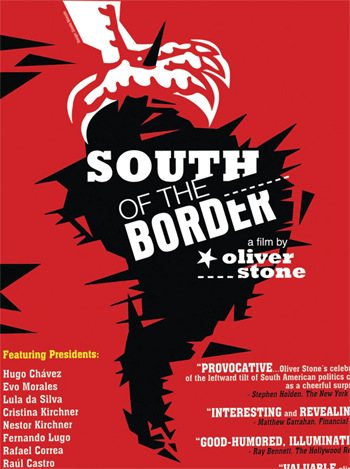 Sometimes a film is of such extraordinary quality that you can be captivated by it before seeing it. So it was for me in the case of Oliver Stone’s latest documentary, South of the Border, about the latest wave of anti-imperialist struggles in Latin America. Stone was planning to introduce the film in person but his views were deemed so threatening to the ruling class on both sides of the Atlantic that the British government wouldn’t let him in. Meanwhile, reviewers castigated Stone for being biased in favour of the Bolivarian Revolution in Venezuela; needless to say, few if any of these reviewers saw anything wrong with being biased in favour of imperialism. For a film to antagonise so many reactionaries so quickly…what was there not to like?
Sometimes a film is of such extraordinary quality that you can be captivated by it before seeing it. So it was for me in the case of Oliver Stone’s latest documentary, South of the Border, about the latest wave of anti-imperialist struggles in Latin America. Stone was planning to introduce the film in person but his views were deemed so threatening to the ruling class on both sides of the Atlantic that the British government wouldn’t let him in. Meanwhile, reviewers castigated Stone for being biased in favour of the Bolivarian Revolution in Venezuela; needless to say, few if any of these reviewers saw anything wrong with being biased in favour of imperialism. For a film to antagonise so many reactionaries so quickly…what was there not to like?
Predictably under the circumstances, Venezuela gets the most coverage. In fact, this film opens with a newscaster on Fox TV announcing that they’ve just got news that Hugo Chavez is involved in drug trafficking, and we hear the word ‘dictator’ repeatedly used by US media outlets and politicians to describe both Chavez and his Bolivian counterpart Evo Morales. Despite the fact that both came to power through multi-party elections, never does the ruling class propaganda machine let the facts get in the way of a good story.
We are taken through a broad outline of Venezuelan history that includes the 1989 Caracas uprising against food price rises (the ensuing repression was a key factor in discrediting the social democrats who presided over it), through the unsuccessful 1992 military revolt that first brought Chavez to prominence, and then his first victory of many in the 1998 presidential elections, to the US-backed coup in 2002. The coup was defeated by a popular uprising which restored Chavez to power; we see the appalling US media disinformation around these events – Fox TV playing a key role – including false claims that opposition demonstrators had been killed by armed Chavistas and that Chavez had resigned voluntarily (one of the most enjoyable moments involves the New York Times, which had circulated the latter fable, having to eat its words after the restoration of Chavez to power).
We see snapshots of the ongoing class struggles in Venezuela, as Stone tours the working class districts with Chavez and observes the mass support for El comandante, while the bourgeois opposition is hysterical about the (so far relatively small-scale) inroads made into its privileges, reviling Chavez as a new Hitler. We see the misiones bringing decent and affordable health care and education to the masses for the first time, with the help of Cuban volunteers who go where the wealthy Venezuelan ‘professionals’ can’t be bothered to.
Other fronts of resistance to US imperialism are covered, although in less detail. Stone manages to interview not only Raul Castro of Cuba (with Venezuela the backbone of the Bolivarian Alternative for the Americas [ALBA], and still by far the most advanced social progress in the Americas), and Rafael Correa of Ecuador. He also speaks to Cristina Fernandez of Argentina and Lula of Brazil. These two have largely accepted the IMF austerity programme with minor tactical reservations, but they know that popular support, or at least the neutralisation of much popular opposition, is to be had by declarations of solidarity with Cuba and Venezuela, so in the film both make a point of doing so.
At the end of the showing of the film that I attended there was a panel discussion to which it would be impossible to do full justice in this review, but a remark by one panellist, an aide to US Democratic congressman Dennis Kucinich, stuck in my throat. He said that the Cuban government should allow its people to vote and that the US economic blockade would be lifted if it did so! I attempted several times to speak during this discussion to refute this amazing claim, but without success. What is clear is that a film by a US national which exposes the crimes of US imperialism is guaranteed to infuriate the latter. For revolutionary and democratic forces striving to build a world without oppression and exploitation, it is a breath of fresh air. We are deeply indebted to Oliver Stone for making South of the Border.




